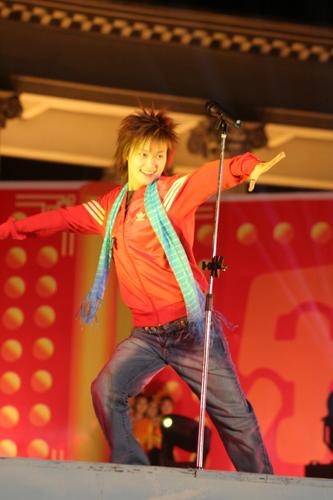Zhou Zuyi/Shanghai Daily news

Li Yuchun (Source:
eastday.com/qq.com)
At the beginning of 2005, Li Yuchun was burning the midnight oil
in the Sichuan Conservatory of Music, busily preparing for her upcoming final
exams and looking beyond the tests to her family's celebrations for the Chinese
New Year.
Now, at the other end of the year, the lanky, rather plain-looking
and shy girl, three months short of her 22nd birthday, is traveling around the
country to promote her first album of songs and being swamped by fans everywhere
she goes.
A Cinderella story
Her
not-all-that-good-looking face appears on billboards in most of China's major
cities, pitching for products ranging from toothpaste to laptops.
And, last
but not least, if you are an event manager who is thinking about inviting Li to
perform at a gig, make sure you have a minimum budget of 500,000 yuan
(US$62,500).
The Cinderella story, made possible by Super Girl - an "American
Idol"-style TV talent show - has sent ripples across Chinese society which are
being read in various ways.
Li is a Cinderella - literally. Neither her looks
nor her voice would place her in the shoes of a typical Chinese pop diva.
What meets your eyes is a girl who looks like a tomboy and even the judges,
who allowed her to top the Super Girl contest - basically a televised singing
competition - admitted she didn't deserve the crown if singing had been the only
thing to be taken into account.
But her obvious disadvantages were overcome
by the three and a half million mobile phone text message votes that were cast
for Li - not to mention the shrieks and hysteria which greeted her every time
she appeared in public.
Many young people are crazy about her unaffected
manner, her easy-going character and her disregard of the showbiz rule book. She
never dressed in skirts, preferred a ha
l boys and she never wore
make-up.
Her individualism struck a chord among an audience tired of the
line-up of bubble-gum and lip-gloss female pop stars.
Her androgynous look
may have reminded people of the good old days of Faye Wong and Anita Mui but the
new trend-setter has had a much more profound impact.
Li, along with all the
other Super Girl-made stars, are the most approachable figures in the Chinese
entertainment industry.
In other words, they are the products of the
interactivity made possible by the TV age, mobile phone networks and
cyberspace.
The days of hiding out in a studio and developing a talent
according to strict managerial guidelines have gone.
Entertainers in China,
for the first time, will know what the market reaction to them is as soon as
they finish a gig.
This has totally removed the traditional barriers to
entering show business and revolutionized the way the pop industry operates.
Mass production of studio stars will remain a part of life, although on the
sidelines, while TV and the Internet have the main job of incubating the
country's new "real" show business icons.
The Super Girl craze reached into
almost every corner of society and gave a full demonstration of the abundant
energy of the so-called "Post-80s" generation who were brought up in an
ever-changing China.
But there was never a shortage of controversy about the
Super Girl mania or even about Li herself.
Many men don't like her because
they say she is not like a traditional Chinese girl and her voice is really
nothing pleasant.
But isn't it all a perfect reflection of our society where
different values co-exist, intertwine and clash?



